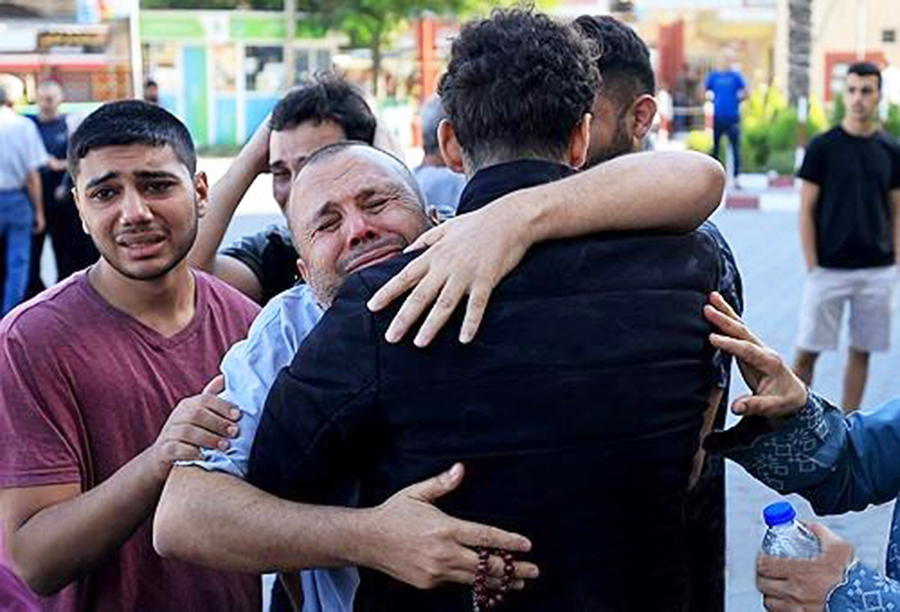
Should we pray for Palestinians, too?
In response to Hamas' surprise attack on Israel, Israel launched a large-scale retaliatory air campaign in the Palestinian Gaza Strip. Reports of indiscriminate bombing in civilian areas, including refugee camps, schools, and hospitals, resulted in the loss of many civilian lives, including young children, and it is heart-wrenching.
As Christians, it profoundly troubles us to contemplate how to view and pray about such a situation. Supporting Israel or advocating for war from a collective perspective, as some far-right Christians claim, is not the right approach.
We need to improve this perspective in three aspects.
First, it misses the progressive and organic nature of biblical revelation. God's word gradually unfolds over time, and the Old and New Testaments are not simply connected one-to-one but have organic unity. In other words, the chosen Israel of the Old Testament does not continue as the Israelite nation of today but points to the church, the spiritual Israel, composed of God's elect.
Second, it overlooks the "covenant theology" that flows through God's redemptive history. The first man, Adam, violated the covenant of obedience that God commanded (Genesis 2:17). However, the gracious God prepared the gospel (Genesis 3:15).
He continued the covenant of grace through His covenant people (Noah, Abraham, Moses, David). Finally, the cross and resurrection of Jesus Christ fulfilled this covenant, and the Holy Spirit applies it to all believers (Ephesians 1:13), culminating in the time of His second coming (Revelation 21:5). The collective repentance of Israel (Romans 11:26) refers to the Jews who will participate in salvation through faith in Christ.
Third, it misses the continuity and discontinuity inherent in the unity of the covenant. The physical descendants of Abraham are not the spiritual Israel of the New Testament but one who has a circumcised heart (Romans 2:28, 29).
The Promised Land is no longer a geographical Canaan but God's church journeying toward the heavenly kingdom. What needs restoration is not the earthly kingdom of Israel but the kingdom of God ruled by Christ.
Confirmation bias refers to the tendency to accept what aligns with one's beliefs and desires, and it is a standard error to fall. Religious groups are one category prone to this bias. When one has combined beliefs with a particular issue, it can lead to terrible and disastrous results, as seen in the example of the "Crusades." Even today, missionaries in the Muslim world are working tirelessly to heal the wounds and misunderstandings caused by the Crusades.
Zionism brought together scattered Israel, but it also became a cause for the 1st (1948), second (1956), third (1967), and fourth (1973) Middle East wars against the Palestinians who had been living in the land for two thousand years.
Israel has committed ethnic cleansing and turned Gaza into the world's largest prison.
Approximately 2.3 million people live under blockade with restricted access to food and necessities. Israel's actions seem to be pouring out anger on the Palestinians, much like seeking revenge for the horrific Holocaust suffered by the Jews during Nazi rule.
German theologian Karl Barth once said, "Take your Bible and take your newspaper, and read both. Nevertheless, interpret newspapers from the Bible." Christ is not only the head of the church but also the God of the entire universe (Colossians 1:20).
Public theology is the church's theology that testifies to God's rule over the world. Christians should possess a flexible balance and a humble attitude, reflecting on whether their beliefs are rooted in blind religious convictions or align with sound theology and God's character and universal values.
Regarding the Hamas and Israel conflict and the Ukraine and Russia conflict, we can discuss the complex international situation and various geopolitical dynamics. We can also share our political perspectives on the matter.
However, we pray sincerely. May God, under international legal agreements that prohibit attacks on civilians in Israel and Hamas, bring an end to the war from a humanitarian perspective, protecting young children. We pray with a heart that values one life more than the entire world. Lord, please stop the war. Let blood not call for blood and prevent revenge from perpetuating the cycle. May war not become an opportunity to profit from selling arms.
God, bestow thy grace and mercy upon the people in the unfortunate land where numerous lives are perishing. May the leaders of the relevant countries promote reconciliation and coexistence as global citizens, transcending their own national interests. May the global Christian community come together to pray for the people of that land. We pray for the swift supply of necessary resources to the refugees.
Hwang Kyung-Chul
Staff for CCC Korea
Hapdong Theological Seminary M.Div. and Ph.D.
Seoul City University, BA in Law
Translated from Korean "The conflict between Hamas and Israel" by BREADTV/RERORMANDA

 Nepali Pastor Sentenced to Prison for Proselytizing
Nepali Pastor Sentenced to Prison for Proselytizing
 The Nashville Statement(2017) and Sexuality
The Nashville Statement(2017) and Sexuality

















